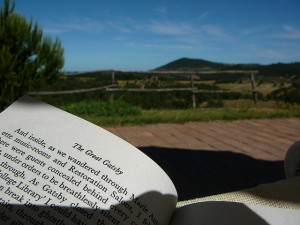

 What happens when Biloxi Junior High students see book spines on their old, unused lockers? It creates a social media storm! The story about the book spines on student lockers was picked up by Mental Floss, but it also worked to beautify their school and engage students. “The teachers selected titles that would appeal to all reading levels, interests and genres. Then, they posted initial pictures of their art project on Facebook, hoping to recruit some volunteers.” With the volunteers and money from the community, the project has been a resounding success.
What happens when Biloxi Junior High students see book spines on their old, unused lockers? It creates a social media storm! The story about the book spines on student lockers was picked up by Mental Floss, but it also worked to beautify their school and engage students. “The teachers selected titles that would appeal to all reading levels, interests and genres. Then, they posted initial pictures of their art project on Facebook, hoping to recruit some volunteers.” With the volunteers and money from the community, the project has been a resounding success.
Did you hear a groan? Well it was probably from one of the pun compitions (yes, there are such a thing) from around the globe. Mental Floss recently did a list of 50 amazing puns from past pun competitions. Check out the full list now!
Can’t wait? Check out the video below from the 2014 Great Durham Pun Championship about High School.
More current content from CMLE
In honor of the end of another school year, here is an article by Julie Winterbottom of Mental Floss: 11 of the Greatest Class Pranks in History! From 1936 up until 2014, these pranks could be hard to beat! Check out this one from right here in Minnesota!
 In honor of the 90th anniversary of its publishing (April 10, 1925), we’ve got an interesting read on ‘The Great Gatsby’ for you! Mental Floss’s How WWII Saved ‘The Great Gatsby’ From Obscurity is a fascinating piece on how “a group of book lovers – authors, librarians, and publishers” changed how our nation thinks of books.
In honor of the 90th anniversary of its publishing (April 10, 1925), we’ve got an interesting read on ‘The Great Gatsby’ for you! Mental Floss’s How WWII Saved ‘The Great Gatsby’ From Obscurity is a fascinating piece on how “a group of book lovers – authors, librarians, and publishers” changed how our nation thinks of books.
Wanting to promote titles that would maintain the country’s morale, they founded the Council on Books in Wartime. Books, they argued, were “weapons in the war of ideas.” In February 1943, they embarked on an ambitious effort: shipping titles to soldiers overseas. The concept was as simple as it was idealistic. While the Nazis were busy burning books, American soldiers would be reading them.”
This post is worth the read – it’s a little bit about history, literature, war, and social change.
Image credit: http://tinyurl.com/o83aore, licensed under CC BY 2.0